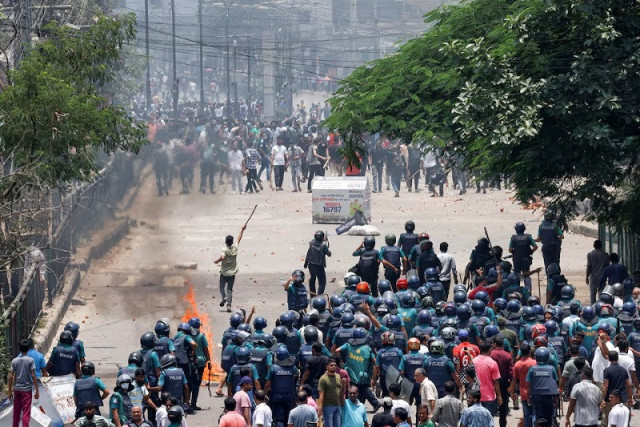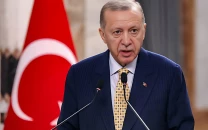Violence flares in Bangladesh
Protesters set state TV HQ ablaze as toll mounts

Bangladeshi students set fire to the countrys state broadcaster on Thursday as protests against civil service hiring rules escalated, with the death toll mounting to at least 39 and authorities imposing what one monitor called a near-total internet blackout.
Police fired rubber bullets at hundreds of protesters, who fought back and chased retreating officers to the headquarters of Bangladesh Television (BTV) in the capital Dhaka.
Demonstrators set ablaze the broadcasters reception building and dozens of vehicles parked outside. A station executive later told AFP that staff had safely evacuated the building.
A day earlier, Prime Minister Sheikh Hasina gave a national address on the network seeking to calm the escalating clashes.
Our first demand is that the prime minister must apologise to us, protester Bidisha Rimjhim, 18, told AFP.
Secondly, justice must be ensured for our killed brothers, she added.
As night fell, Bangladesh was plunged into a near-total internet shutdown, outage monitor NetBlocks said.
It said the latest outage follows earlier efforts to throttle social media and restrict mobile data services -- key communication tools for protest organisers.
Near-daily marches this month have demanded an end to a quota system that reserves more than half of civil service posts for specific groups, including children of veterans from the countrys 1971 liberation war against Pakistan.
Critics say the scheme benefits children of pro-government groups that back Hasina, 76, who has ruled the country since 2009 and won her fourth consecutive election in January after a vote without genuine opposition.
Hasinas government is accused by rights groups of misusing state institutions to entrench its hold on power and stamping out dissent, including by the extrajudicial killing of opposition activists.
Her administration this week ordered schools and universities to close indefinitely as police step up efforts to bring the deteriorating law and order situation under control.
Mubashar Hasan, a Bangladesh expert at the University of Oslo in Norway, said the protests had grown into a wider expression of discontent with Hasinas autocratic rule.
They are protesting against the repressive nature of the state, he told AFP. The students are in fact calling her a dictator.
Hasina appeared on BTV on Wednesday night to condemn the murder of protesters and vow that those responsible would be punished regardless of political affiliation. But the violence worsened despite her appeal for calm, and police again attempted to break up demonstrations with rubber bullets and tear gas volleys.


1725099588-0/BeFunky-(41)1725099588-0-208x130.webp)
















COMMENTS
Comments are moderated and generally will be posted if they are on-topic and not abusive.
For more information, please see our Comments FAQ